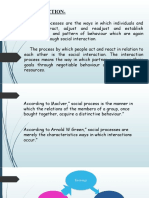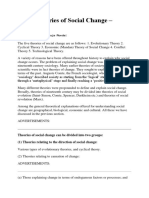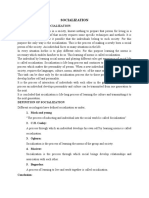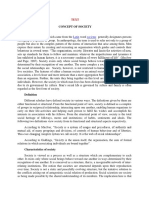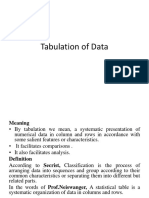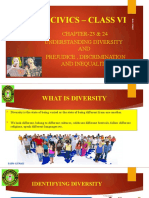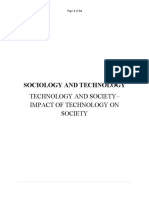Professional Documents
Culture Documents
Technological Factors of Social Change
Technological Factors of Social Change
Uploaded by
Vicky VermaOriginal Description:
Copyright
Available Formats
Share this document
Did you find this document useful?
Is this content inappropriate?
Report this DocumentCopyright:
Available Formats
Technological Factors of Social Change
Technological Factors of Social Change
Uploaded by
Vicky VermaCopyright:
Available Formats
Technological Factors of Social Change
Introduction: The technological factors represent the conditions created by man which have a
profound influence on his life. In an attempt to satisfy his wants, fulfill his needs and to make his
life more comfortable, man builds civilization. Technology is a product of civilization. When the
scientific knowledge is applied to the problems of life, it becomes technology. Technology is a
systematic knowledge which is put into practice, i.e. to use tools and run machines to serve
human purposes. The Modern Age is often called the Technological Age or the Mechanical Era.
In utilizing the products of technology man provokes social changes. The social effects of
technology are far-reaching. Karl Marx, Veblen and few others have regarded technology as the
sole explanation of social change. A single invention may have innumerable social effects.
Radio, for e.g. has influenced our entertainment, education, politics, sports, literature, attitudes,
knowledge and so on. W. G. Ogburn says, “Technology changes society by changing our
environments to which we in turn adapt. This change is usually in the material environment and
the adjustment that we make with these changes often modifies customs and social institutions.”
Technology and technological changes continue to affect the human life and social order which
may be discussed:
1. Industrialization: Technology has contributed to the growth of industries or to the
process of industrialization. It describes in general terms the growth of a society in which
a major role is played by manufacturing industry of the modern type. The industry is
characterized by heavy fixed capital investment in plant and building, by the application
of science to industrial techniques, and by mainly large scale standardized production.
Industrialization is associated with factory system of production in which goods are
produced in factories instead of homes. The family has lost its economic importance. The
whole process of production is mechanized which have brought down the prices of
commodities improved their quality and maximized their output. Consequently, the
traditional skills have declined and a good number of artisans have lost their work. Huge
factories could provide employment opportunities to thousands of people. Hence men
have become workers in factories in a very big number. The process of industrialization
has affected the nature, character and the growth of economy. It has contributed to the
growth of cities or to the process of urbanization.
2. Urbanization: In many countries, the growth of industries has contributed to the growth
of cities. Mitchell refers to urbanization as being the process of becoming urban, moving
to cities, changing from agriculture to other pursuits common to cities, and corresponding
change of behavior patterns. Hence, only when a large proportion of inhabitants in an
area come to cities, urbanization is said to occur. England, America, Germany and Israel
are the most urbanized countries of the world where more than 75% of the people live in
towns and cities. As a result of industrialization people have started moving towards the
industrial areas in search of employment. Due to this, the industrial areas developed into
towns and cities. A number of such industrial cities are there in the world now.
Bangalore, Durgapur, Kanpur, Bombay, Calcutta, Manchester, Lancashire of England,
Chicago and Detroit of America can be mentioned here as examples. The growth of cities
or urbanization has resulted in urban concentration and rural depopulation. The
unregulated growth of cities has caused problems such as- overcrowding, congestion,
insanitation, inadequate water and electricity supply; lack of privacy and intimacy, etc.
The cities have also become the centers of various socio-economic problems such as
crime, juvenile delinquency, gambling, prostitution, etc.
3. Modernization: Modernization is a process which indicates the adoption of the modern
ways of life and values. It refers to an attempt on the part of the people, particularly those
who are custom-bound, to adopt themselves to the present time conditions, needs, styles,
and ways in general. It indicates a change in people’s food habits, dress pattern, speaking
styles, tastes, choices, preferences, ideas, values and so on. People in the process of
getting them modernized give more and more importance to science and technology. The
scientific and technological inventions have modernized societies in various countries.
They have brought about remarkable changes in the whole system of social relationships
and installed new ideologies in place of traditional ones, which introduces role
differentiations in almost all aspects of life.
4. Development of the means of transport and communication: Development of
transport and communication has led to the national and international trade on a large
scale. The road transport, the train services, the ships and airplanes have eased the
movement of men and material goods. Post and telegraph, radio and television,
newspapers and magazines, telephone and wireless and the like, have developed a great
deal. The space research and the launching of satellites for communication purposes have
further added to these developments. They have helped the people bringing to different
corners of nation or world to have regular contacts. The world has shrunk in size. The
intermixing of the people has led to the removal of prejudices and misunderstandings.
5. Transformation in economy and the evolution of new social classes: The introduction
of the factory system of production has turned the agrarian economy into industrial
economy. The industrial economy is popularly known as capitalist economy. This
transformation in economy has divided the social organization into two predominant
classes- the capitalist and the working class. These two classes are always at conflict
because of mutual opposite interests. In course of time an intermediary class called the
middle class has evolved. This class which consists of the so called white-collar people is
playing an important role in society.
6. Unemployment: The problem of unemployment is a concomitant feature of the rapid
technological advancement. Machines not only provide employment opportunities for
men but they also take away the jobs of men through labour- saving devices. This results
in what is known as the technological unemployment.
7. Technology and war: The highly dangerous effect of technology is evident through the
modern mode of warfare. Today not men, but guns, not hands, but bombs fight the battle.
The atom bomb and hydrogen bomb have brought new fears and anxiety for mankind.
The atomic and the bacteriological wars that can destroy the entire human race reveal
how technology could be misused. However, technology could be used for positive
constructive aspects also.
8. Changes in values: Industrialization, urbanization, development in means of transport
and communication, the progress of democracy, introduction of secular education, etc.
have had profound effects on the beliefs, ideals, tendencies and thoughts of the people.
This has led to a vast transformation in the values of life. Industrialization and
mechanization have brought new values and philosophies. The traditional values have
changed. Things are measured more in pecuniary terms. Men are devoted more to
quantity than to quality, to measurement than to appreciation. Human beings by the use
of machines have become less human, more passive and more mechanical. Technological
inventions and industrial expansion have very directly promoted hedonism. People want
to have ‘good time’ always. They have become pleasure seekers. They want to maximize
their pleasure by putting forth minimum or no efforts. Mounting production has provided
them with enough money and also leisure to plan and to enjoy. More importance is given
to pomp and show than to contemplation and thought. Human relations are becoming
impersonal and secondary. On all sides, one is confronted with human machines which
possess motion but not sincerity, life but not emotions, heart but not feelings. There has
been a movement towards individualism. Individuals are moving away from their family
and community, loyalty and responsibility. Individualism has intensified social and
psychological up rootedness. Technology has substituted the hand work with the head
work in which there is space for manipulation of people instead of things. ‘The sense of
being alone and operating alone, manipulating others and being manipulated by others.’
9. Changes in Social institutions: Technology has profoundly altered our modes of life and
also thought process. The institutions of family, religion, morality, marriage, state,
property, etc. have been altered. Modern technology in taking away industry from the
household has radically changed the family organization. Many functions of the family
have been taken away by other agencies. Women are enjoying more leisure at home
nowadays. Many of their work are done by modern household electric appliances. Due to
invention of birth control techniques the size of the family is reduced. Marriage has lost
its sanctity. It is treated more as a civil-socio contract than a sacred bond. Marriages are
becoming more and more unstable. Instances of divorce, desertion and separation are
increasing. Technology has elevated the status of women but it also has contributed to the
stresses and strains in the relations between men and women at home. Religion is losing
its hold as a belief over the members but as an identity it has become strong. People are
becoming more secular, rational and scientific, but less religious in their outlook. Though
religion has not been directly affected by the modern technology, inventions and
discoveries in science have shaken the foundations of religion. They have changed
attitudes towards religious rituals and creeds. The functions of the state or state activity
have been widened. The modern states call themselves ‘welfare’ states. They have
become secular in nature. Modern inventions have made the states to perform such
functions as- protection of the aged, the weaker sections and minorities, making
provisions for schools, colleges, universities, child labour laws, health measures, juvenile
courts, etc. Transportation and communication inventions are leading to a shift of
functions from local government to the Central government of the whole state. The
modern inventions have also strengthened nationalism. The modern governments which
rule through the bureaucracy have further impersonalized the human relations.
Perhaps the most striking change in modern times is the change in economic
organizations. Industry has been taken away from the household and new types of
economic organizations have been set up such as factories, stores, banks, joint stock
companies, corporations, etc. Introduction of factories changes the character of relations
between the employer and the employees. Modern inventions in the form of e-business
and shopping has increased the purchasing power of consumer.
You might also like
- Cyclic Theory of Social ChangeDocument2 pagesCyclic Theory of Social Changejcm210802387% (15)
- Family SociologyDocument15 pagesFamily Sociologyshruti verma100% (4)
- MODULE 1 Nature and Scope of DemographyDocument7 pagesMODULE 1 Nature and Scope of DemographyThemba Mdlalose88% (8)
- Sociology Project NityamDocument15 pagesSociology Project NityamSiddhu100% (1)
- Social ControlDocument8 pagesSocial ControlSumaira MalikNo ratings yet
- Sociology Assignment - Definition, Nature & Scope, DevelopmentDocument6 pagesSociology Assignment - Definition, Nature & Scope, DevelopmentKhalid Hasan Zibon83% (6)
- Cultural LagDocument3 pagesCultural LagJona D'john100% (1)
- Women EmpowermentDocument10 pagesWomen EmpowermentLekshmi Manu100% (4)
- Jajmani SystemDocument11 pagesJajmani SystemYash Tiwari100% (1)
- How Human Relations Are Transformed by Social SystemsDocument5 pagesHow Human Relations Are Transformed by Social SystemsJenny Vasquez90% (10)
- Formulation of Research ProblemDocument3 pagesFormulation of Research ProblemVicky VermaNo ratings yet
- Meaning and Definition of ModernisationDocument3 pagesMeaning and Definition of Modernisationshraddha100% (7)
- Rural and Urban SocietyDocument15 pagesRural and Urban Societyvijay chittiboyina100% (1)
- Features of Caste SystemDocument2 pagesFeatures of Caste Systemjyoti kundu100% (1)
- Caste and ClassDocument7 pagesCaste and ClassSuresh Murugan100% (6)
- Socialisation: The Meaning, Features, Types, Stages and ImportanceDocument39 pagesSocialisation: The Meaning, Features, Types, Stages and Importanceneel721507100% (1)
- Social DisorganizationDocument7 pagesSocial DisorganizationSyed Hassan100% (3)
- Social Change: Characteristics and Factors: MeaningDocument27 pagesSocial Change: Characteristics and Factors: MeaningVenkata Vineeth100% (1)
- On Social ProcessDocument31 pagesOn Social ProcessAmlan jyoti thanapati0% (1)
- Top 5 Theories of Social ChangeDocument21 pagesTop 5 Theories of Social ChangeAmine Jad100% (2)
- Population Explosion in IndiaDocument17 pagesPopulation Explosion in IndiaSohel BangiNo ratings yet
- BA - 3rd, Types of Social Disorganization by Mrinal ManjariDocument8 pagesBA - 3rd, Types of Social Disorganization by Mrinal ManjariPapori DekaNo ratings yet
- Major Concerns of Sociology - Nature and ScopeDocument7 pagesMajor Concerns of Sociology - Nature and ScopeSwati Agarwal83% (6)
- Aligarh Muslim University Centre Murshidabad: A Project On Globaisation and Social Change in IndiaDocument30 pagesAligarh Muslim University Centre Murshidabad: A Project On Globaisation and Social Change in IndiaDaniyal sirajNo ratings yet
- Equitable Use of Resources For Sustainable LifestylesDocument3 pagesEquitable Use of Resources For Sustainable LifestylesSoumendra Roy75% (4)
- Dissociative ProcessesDocument24 pagesDissociative ProcessesDiana Bernal100% (1)
- Poverty and UnemploymentDocument10 pagesPoverty and UnemploymentJOSEPH HERBERT MABELNo ratings yet
- Community Association Institutions SociologyDocument15 pagesCommunity Association Institutions SociologyDesi Boy0% (1)
- Chapter Iii Causes and Implications of BeggaryDocument56 pagesChapter Iii Causes and Implications of BeggaryPrateek Tanmay33% (3)
- IGNOU Block 1 Unit 1 Concepts of Community HealthDocument17 pagesIGNOU Block 1 Unit 1 Concepts of Community Healtherice.research100% (1)
- Crowd Notes SociologyDocument6 pagesCrowd Notes SociologyAyesha Khalid0% (1)
- Introduction of SocializationDocument5 pagesIntroduction of SocializationOsama Aadil Saadi100% (2)
- Sanskritization: Meaning, Characteristics, Models and EffectsDocument4 pagesSanskritization: Meaning, Characteristics, Models and EffectsSamiksha PawarNo ratings yet
- Frustration and ConflictDocument6 pagesFrustration and ConflictKamlakar Sadavarte100% (2)
- ModernizationDocument24 pagesModernizationSheetal NagarNo ratings yet
- Characteristics of Family: Mrs - Neethu Vincent Asst Professor KVM College of NursingDocument6 pagesCharacteristics of Family: Mrs - Neethu Vincent Asst Professor KVM College of NursingNeethu VincentNo ratings yet
- Theory of Class and Class Struggle.: AdvertisementsDocument5 pagesTheory of Class and Class Struggle.: AdvertisementsMuskan Khatri100% (2)
- Society - Meaning and CharacteristicsDocument3 pagesSociety - Meaning and CharacteristicsVaibhav Kumar Dev50% (2)
- 4 Social ChangeDocument5 pages4 Social ChangeVitas Vitaly100% (1)
- Nehruvian ConsensusDocument5 pagesNehruvian ConsensusReena Hooda Dahiya0% (1)
- M N SrinivasDocument5 pagesM N SrinivasSandeep Kumar Meena100% (1)
- Tabulation of DataDocument19 pagesTabulation of DataAJAY SINGH MAURYA100% (1)
- Five Years Plans of India by AffairsCloudDocument4 pagesFive Years Plans of India by AffairsCloudnagajyothi67% (3)
- CHN Assignment (Child Labour)Document13 pagesCHN Assignment (Child Labour)binjuNo ratings yet
- Nature, Scope and Method of EthicsDocument24 pagesNature, Scope and Method of Ethicsolive100% (1)
- Definition, Nature, Scope, Subject MatterDocument7 pagesDefinition, Nature, Scope, Subject MatterNikon SonuNo ratings yet
- Characteristics of SocietyDocument11 pagesCharacteristics of Societyalisyed37100% (1)
- Understanding Diversity With Prejudice, Discrimination and InequalityDocument15 pagesUnderstanding Diversity With Prejudice, Discrimination and InequalityRajesh Antony100% (8)
- Rural, Urban & Tribal CommunityDocument41 pagesRural, Urban & Tribal CommunityShivani TiwariNo ratings yet
- Difference Between Growth and DevelopmentDocument4 pagesDifference Between Growth and Developmentrameen bhatti88% (8)
- Roles and Status Full NotesDocument4 pagesRoles and Status Full NotesArchana Patwal100% (1)
- Basic Concepts of Community and Association PDFDocument2 pagesBasic Concepts of Community and Association PDFSuneel Kumar PrajapatiNo ratings yet
- What Are The Basic Characteristics of Indian EconomyDocument5 pagesWhat Are The Basic Characteristics of Indian EconomyHarshit dua50% (2)
- Final Social ControlDocument20 pagesFinal Social ControlSumaira Malik50% (2)
- Womens Studies in IndiaDocument16 pagesWomens Studies in IndiaAnil PintoNo ratings yet
- Social Change TheoryDocument30 pagesSocial Change TheorySandeep Gosai100% (1)
- Liberal - Political Science IGNOUDocument10 pagesLiberal - Political Science IGNOUDesi Boy100% (1)
- SocializationDocument9 pagesSocializationChankel PasrichaNo ratings yet
- India - Five Year PlansDocument7 pagesIndia - Five Year PlansvmktptNo ratings yet
- Sociology and TechnologyDocument14 pagesSociology and TechnologyMuhammad AlamNo ratings yet
- 3CHI - Tech and Its Impact - PulchowkDocument101 pages3CHI - Tech and Its Impact - PulchowkSubash PoudelNo ratings yet
- 0 - Case Commentary Pe Hikmat AliDocument2 pages0 - Case Commentary Pe Hikmat AliVicky VermaNo ratings yet
- Winding Up and Dissolution ComparativeAnalysisDocument13 pagesWinding Up and Dissolution ComparativeAnalysisVicky VermaNo ratings yet
- PDF Study On Special Economic Zones in India CompressDocument38 pagesPDF Study On Special Economic Zones in India CompressVicky VermaNo ratings yet
- Nternational Ourt OF Ustice: Nalsar Unhcr P I L M C C, 2021Document40 pagesNternational Ourt OF Ustice: Nalsar Unhcr P I L M C C, 2021Vicky VermaNo ratings yet
- Nternational Ourt OF Ustice: Nalsar Unhcr P I L M C C, 2021Document50 pagesNternational Ourt OF Ustice: Nalsar Unhcr P I L M C C, 2021Khushi KhuranaNo ratings yet
- JTXT9001099898 Nalsar Unhcr Public Intl Law Moot 02 2021 TM Rajnarayanverma004 Gmailcom 20220408 223015 1 21Document21 pagesJTXT9001099898 Nalsar Unhcr Public Intl Law Moot 02 2021 TM Rajnarayanverma004 Gmailcom 20220408 223015 1 21Vicky VermaNo ratings yet
- Neighbouring Rights Protection in India: Sanjay PandeyDocument15 pagesNeighbouring Rights Protection in India: Sanjay PandeyVicky VermaNo ratings yet
- Nature:: Research Design: Nature, Elements and Its TypesDocument5 pagesNature:: Research Design: Nature, Elements and Its TypesVicky Verma100% (1)
- Neighbouring Rights Protection in India: Sanjay PandeyDocument15 pagesNeighbouring Rights Protection in India: Sanjay PandeyVicky VermaNo ratings yet
- PDF Private International LawDocument10 pagesPDF Private International LawVicky VermaNo ratings yet
- Rural Development Programmes in IndiaDocument4 pagesRural Development Programmes in IndiaVicky VermaNo ratings yet
- Illiteracy in Rural IndiaDocument2 pagesIlliteracy in Rural IndiaVicky VermaNo ratings yet


















